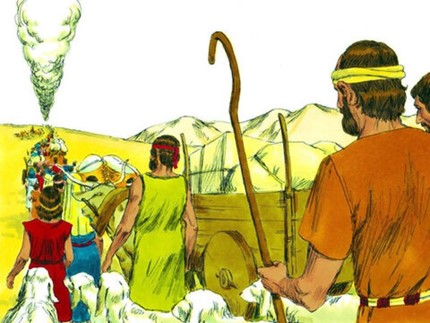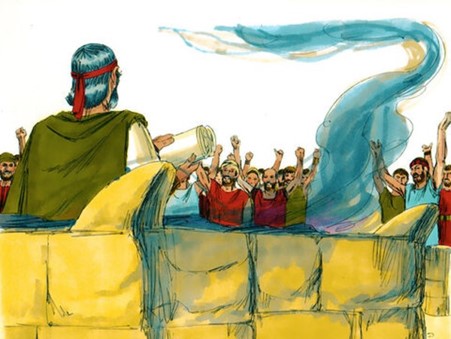Good morning!
Greetings in the name of the Father, the son, and the Holy Spirit.
But now you must be holy in everything you do, just as God who chose you is holy. For the Scriptures say, “You must be holy because I am holy.” (1 Peter 1:15-16)
- Introduction

Imagine, if you will, the scene unfolding before us in Exodus 19. Thousands upon thousands of Israelites, a sea of humanity, journeying through the harsh, unforgiving wilderness. The sun beats down upon them, the dry desert wind whipping up the sand around their feet. They are a people on the move, a people with a purpose, led by a man named Moses, chosen by God to guide them.
Above them, the sky is a brilliant, unbroken blue, stretching out as far as the eye can see. But they are not alone in this vast expanse. They are under the watchful care of the Almighty, their God, who has promised to lead them to a land flowing with milk and honey.
Suddenly, in the distance, a mountain range looms into view. Among these, one mountain stands out – Mount Sinai. It’s there, at the foot of this mountain, that they set up camp. The air is filled with a sense of anticipation, a sense of sacred expectancy. For it is here that God has promised to meet with them, to reveal Himself to them in a way they have never experienced before.
As we delve into Exodus 19 today, we find ourselves joining the Israelites at the foot of Mount Sinai. We stand with them, on the brink of a divine encounter, an encounter with the Holy God. We will explore His holiness, our call to obedience, and the profound love that underpins the covenant He establishes with His people. And as we journey through this ancient text, we will discover its enduring relevance, its echoes in the New Testament, and its implications for us as followers of Jesus Christ.
So, let us journey together, from Sinai to Calvary, exploring God’s holiness, our obedience, and the love of Christ.
II. The Holy Mountain: God’s Sacred Presence

As we stand with the Israelites at the foot of Mount Sinai, we can almost feel the tremors of anticipation running through the crowd. This is no ordinary mountain. This is a place where the boundary between heaven and earth seems to blur, a place where the Divine chooses to meet humanity.
In Exodus 19:11, God declares,
“On the third day the LORD will come down on Mount Sinai in the sight of all the people.”
This mountain, in the midst of the wilderness, becomes a sacred space, a holy ground, because of God’s sacred presence.
The holiness of Mount Sinai is not about the mountain itself, but about the One who descends upon it. It’s about God’s sacred presence, His otherness, His transcendence. The mountain becomes holy because the Holy One is there.
This concept of God’s holiness and His sacred presence is not confined to the Old Testament. In the New Testament, we see God revealing Himself through Jesus Christ.
In John 1:14, we read,
“The Word became flesh and made his dwelling among us. We have seen his glory, the glory of the one and only Son, who came from the Father, full of grace and truth.”
Jesus, God incarnate, is the ultimate revelation of God’s sacred presence among humanity. He is Immanuel, God with us. And through His life, death, and resurrection, He has made a way for us to approach the holy God, to have a relationship with Him.
As we reflect on the scene at Mount Sinai, let us also remember the cross at Calvary. For it is at the cross where the holiness of God and the sinfulness of man collide. It is there that God’s sacred presence is most profoundly demonstrated in His self-giving love.
So, as we stand at the foot of Mount Sinai, let us be awed by God’s holiness, His sacred presence. And let us carry this awe into our understanding of Jesus’ work on the cross, marveling at the holy God who chose to dwell among us, to redeem us, and to call us His own.
In the New Testament, we see this sacred presence of God in the person of Jesus Christ.
Jesus, God incarnate, is the ultimate revelation of God’s sacred presence among humanity. He is Immanuel, God with us. And through His life, death, and resurrection, He has made a way for us to approach the holy God, to have a relationship with Him.
As we reflect on the scene at Mount Sinai, let us also remember the cross at Calvary. For it is at the cross where the holiness of God and the sinfulness of man collide. It is there that God’s sacred presence is most profoundly demonstrated in His self-giving love.
So, as we stand at the foot of Mount Sinai, let us be awed by God’s holiness, His sacred presence. And let us carry this awe into our understanding of Jesus’ work on the cross, marveling at the holy God who chose to dwell among us, to redeem us, and to call us His own.
In Hebrews 12:18-24, the author draws a direct line from Mount Sinai to the New Covenant in Jesus Christ. We are reminded that we have not come to a physical mountain, but to Mount Zion, the heavenly Jerusalem, the city of the living God. We have come to Jesus, the mediator of a new covenant.
As we delve deeper into Exodus 19, let us keep this in mind. The God who descended on Mount Sinai in fire and smoke is the same God who descended to earth in the person of Jesus Christ. His holiness remains the same, His sacred presence is still with us, and His desire for a relationship with us is fulfilled in Jesus Christ.
In conclusion, the scene at Mount Sinai serves as a powerful reminder of God’s sacred presence, His holiness, and His desire to dwell among His people. As we reflect on this, let us also remember that through Jesus Christ, we too can experience this sacred presence. We too can approach the holy God, not with fear and trembling, but with confidence and joy, because of Jesus’ work on the cross.
III. Covenant Relationship: God’s Love and Commitment

In Exodus 19, we witness the establishment of a covenant relationship between God and the Israelites. God, in His infinite love and commitment, promises to make the Israelites His treasured possession, a kingdom of priests and a holy nation, if they obey His commandments (Exodus 19:5-6). This covenant is not based on the Israelites’ merit but on God’s gracious choice and steadfast love.
This covenant relationship is a testament to God’s faithfulness and His desire for a relationship with His people. It’s a relationship marked by mutual commitment: God’s unwavering faithfulness and the people’s obedience to His laws.
The New Testament reveals the fulfillment and expansion of this covenant relationship through Jesus Christ. In the book of Hebrews, we read that Jesus is the mediator of a new covenant (Hebrews 9:15). This new covenant, sealed by the blood of Jesus, offers forgiveness of sins and establishes a relationship between God and all who believe in Jesus, not just the Israelites.
In Romans 5:8, we see the depth of God’s love in this covenant relationship: “But God demonstrates his own love for us in this: While we were still sinners, Christ died for us.” This verse encapsulates the essence of the new covenant – God’s love is so profound that He sent His Son to die for us, even while we were still sinners.
Moreover, in 1 Peter 2:9, believers are described in terms reminiscent of Exodus 19: “But you are a chosen people, a royal priesthood, a holy nation, God’s special possession, that you may declare the praises of him who called you out of darkness into his wonderful light.” This verse reaffirms that through Christ, believers are part of God’s covenant community, chosen and set apart to proclaim His excellencies.
Reflecting on the covenant relationship established at Mount Sinai, we see a picture of a God who is deeply committed to His people. This covenant, however, was just a shadow of a greater covenant to come, one that would be established through the life, death, and resurrection of Jesus Christ.
In the New Testament, we see the fulfillment of God’s covenant promises in Jesus. Through His sacrificial death on the cross, Jesus established a new covenant, one that offers forgiveness of sins and eternal life to all who believe in Him. This covenant is not limited to a specific group of people, but is open to everyone, regardless of their ethnicity, social status, or past mistakes.
This new covenant is marked by God’s unwavering love and commitment. Romans 5:8 tells us that “God demonstrates his own love for us in this: While we were still sinners, Christ died for us.” This is the essence of the new covenant – a God who loves us so much that He was willing to send His Son to die for us, even while we were still in rebellion against Him.
But this covenant relationship is not one-sided. It also calls us to a response. As recipients of God’s overwhelming love and grace, we are called to live lives of obedience and gratitude. We are called to be a “chosen people, a royal priesthood, a holy nation, God’s special possession” (1 Peter 2:9), set apart to declare the praises of God.
Thus, as we reflect on the covenant relationship established at Mount Sinai and its fulfillment in Jesus Christ, let us be awed by the depth of God’s love and commitment to us. And let this understanding inspire us to live lives that reflect our gratitude and commitment to Him.
IV. Conclusion
As we reflect on Exodus 19, we are drawn into a deeper understanding of God’s character and His relationship with His people.
Mount Sinai, as the place where God chose to reveal Himself and give His law, is a testament to God’s holiness. It is a sacred place, set apart for an extraordinary encounter between God and His people. This reminds us of the sanctity of places where God makes His presence known, whether it be a physical location like a church or a spiritual space in our hearts during times of prayer and worship. God’s presence is holy, and we are called to approach Him with reverence and awe.
The covenant God establishes with the Israelites in Exodus 19 is a powerful demonstration of His steadfast love and commitment. Despite their shortcomings, God chooses the Israelites as His treasured possession and enters into a covenant relationship with them. This covenant is not based on the Israelites’ merits but on God’s gracious choice.
This covenant relationship foreshadows the New Covenant established through Jesus’ sacrifice on the cross. In the New Testament, we see the ultimate expression of God’s love and commitment in Jesus Christ. He fulfills the law given at Mount Sinai and establishes a new covenant through His blood, offering forgiveness of sins and eternal life to all who believe in Him.
As we apply these truths to our lives, let us approach God with reverence, recognizing the holiness of His presence in our lives. Let us also remember the steadfast love and commitment that God has shown us through the covenant established in Jesus Christ. This should inspire us to live lives of faith and obedience, reflecting God’s love in our interactions with others.
In times of difficulty or uncertainty, let us find comfort and peace in the knowledge that we are part of God’s covenant people, loved and chosen by Him. As Romans 8:38-39 assures us, “For I am convinced that neither death nor life, neither angels nor demons, neither the present nor the future, nor any powers, neither height nor depth, nor anything else in all creation, will be able to separate us from the love of God that is in Christ Jesus our Lord.”
Let us pray,
Heavenly Father, we thank You for Your holy presence in our lives and for the covenant relationship You have established with us through Jesus Christ. We are in awe of Your steadfast love and commitment towards us. Help us to live lives that reflect Your love and holiness. In times of difficulty, remind us of Your unchanging love and faithfulness. May we find comfort and peace in Your presence, knowing that nothing can separate us from Your love in Christ Jesus. In Jesus’ name, we pray. Amen.

We know how much God loves us, and we have put our trust in his love. God is love, and all who live in love live in God, and God lives in them. (1 John 4:16)
